Harris Cooper is an emeritus professor of psychology and neuroscience at Duke University. In 2022, he ushered at Durham Bulls Athletic Park and wrote a book about it, Finding America in a Minor League Ballpark: A Season Hosting for the Durham Bulls, which we are excerpting below. This is published with permission from Skyhorse Publishing.
Tuesday, April 12
“The bird poop early in the season is a pain in the ass,” advises a veteran host. “They hang out around the roof. Watch your head and examine your seats before the fans start arriving.”
Not exactly what I wanted to hear as I arrive for my first day at work an hour early, hoping to meet some folks and get some on-the-job training from the veterans.
Kids congregate at the fence by the warning track and plead with the players to give them a ball. Sometimes the players do. They obstruct the view of the fans behind them. Plus, it’s against the fire code to stand in the aisles.
Today, I would see two kids hit the jackpot. No matter how vigilant I am, kids come back to the railing waving their gloves in the air. Shooing them away makes me feel like a grinch. And I know my efforts will never succeed. The kids are on what behaviorists–think B.F. Skinner–call a variable-ratio reinforcement schedule. That’s a fancy sounding name for the kids thinking, “If I keep asking, eventually I’ll get one. I don’t know how many times I need to ask, but eventually it will happen.”
Skinner showed that reinforcing behavior on a variable ratio schedule creates persistence that is incredibly hard to extinguish. Pigeons will peck at a target hundreds of times to get a seed just once in a while, on a schedule they can’t predict. The kids are doing the same thing, as are gamblers sitting at a slot machine. Knowing this, I also know my efforts at fire safety may hustle kids away temporarily, but I will be doing this over and over again.
Wednesday, April 27
Today, I’m the K-Wall guy. While walking out to check my position, I pass a host who is on patrol in the Diamond View seats. He’s hunting for balls that have left the park during the Bulls’ batting practice.
The K-Wall is a tradition in many ballparks. Each time the home team pitcher strikes out a batter, a large “K” is draped over a designated section of an outfield wall. In DBAP, it’s left center field, just to the right of the Tobacco Road restaurant.
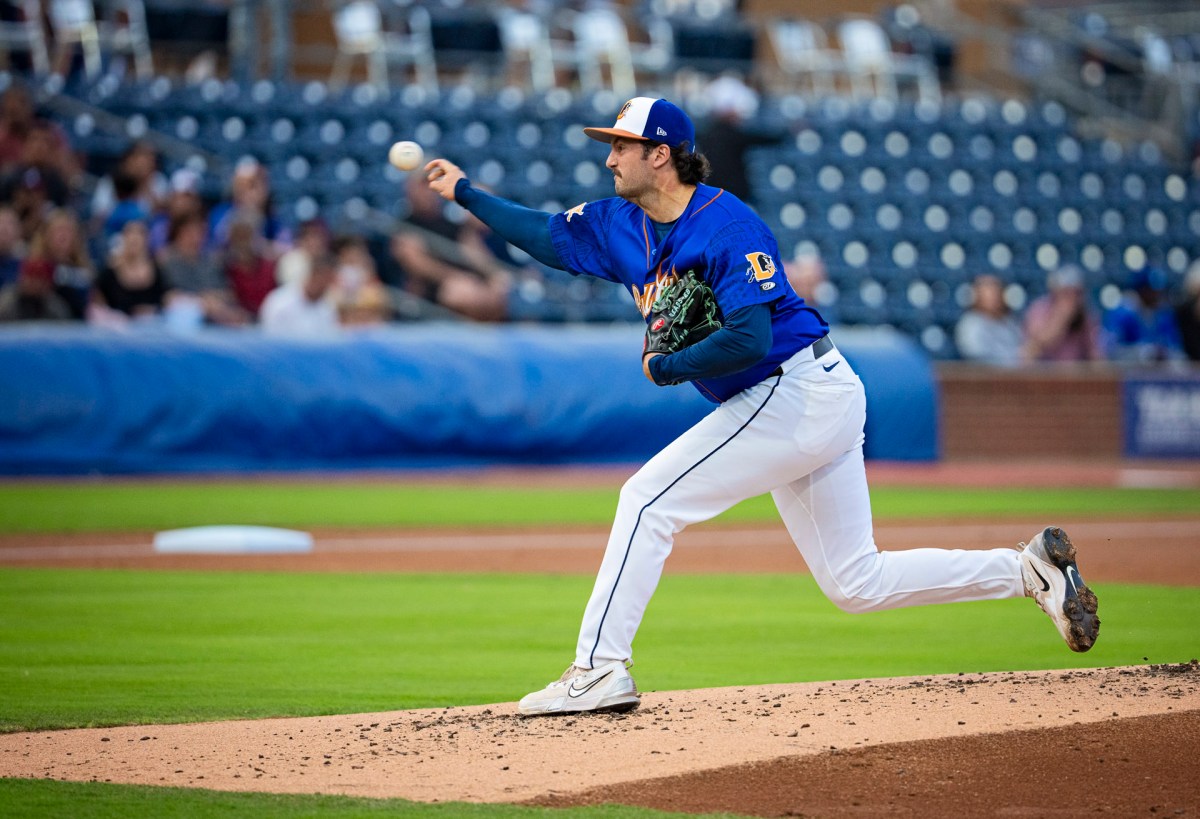
For the first time, I meet someone I know. On the restaurant patio outdoor seating, I’m recognized by a fellow Duke social psychologist. After explaining myself, he tells me that he is at the game on business. He’s hosting a conference dealing with how to ease the transition of military veterans to civilian life. There are three retired three-star generals at the conference. The group decided on a ballgame for their evening activity.
When the game is over, I’ve hung 13 K’s. The Bulls used five pitchers. And, yes, I put up two K’s and waited until the fourth K to put up K’s No. 3 and No. 4.
Saturday, April 30
Tonight is the “Copa de la Diversion,” or “Fun Cup,” event at Durham Bulls Athletic Park. It is “designed to embrace the culture and values that resonate most with participating teams’ local Hispanic/Latino communities.” The night is celebrated in 85 minor league ballparks in 33 states.
The Bulls event features “Cervezas de Durham,” or the beers of Durham. You can buy hats and T-shirts with a special logo or quaff a brew from the Bull Durham Beer Co., the only in-stadium brewery in minor league baseball. Doors open 30 minutes early, mariachi music blares from the speakers, a live band plays on a party deck, and the flags of Central and South American countries decorate the seating bowl walkway.
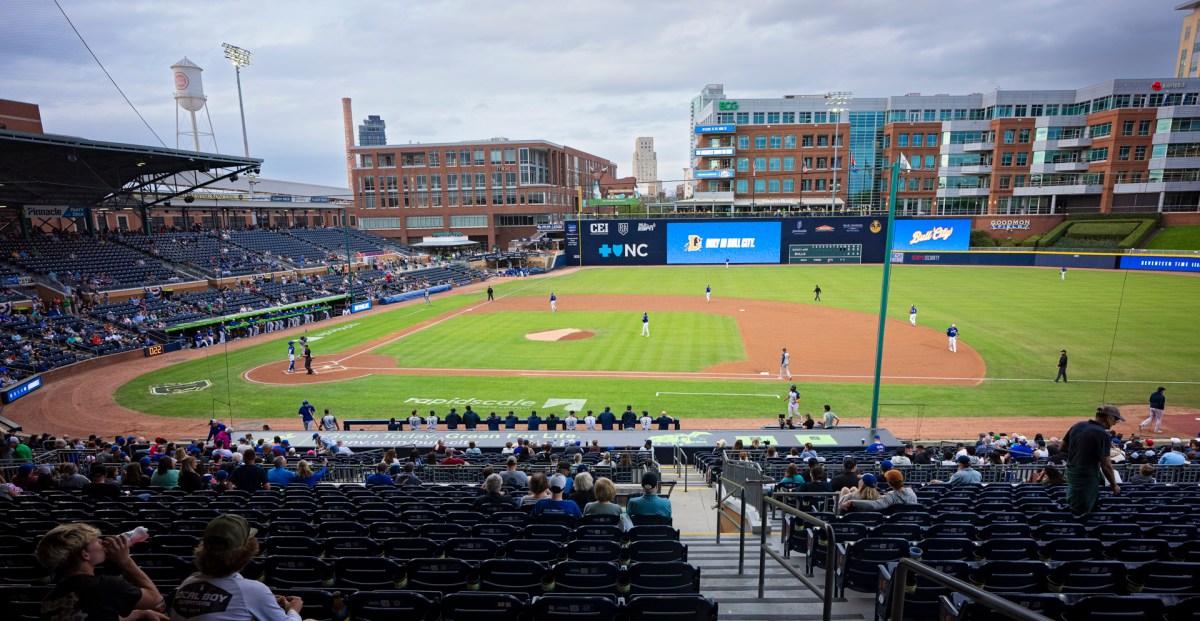
Ninety minutes before the game starts, I’m sitting down cracking open some salted peanuts, looking out on the field. The fans haven’t started filing in yet. Scott, the assistant general manager, sees me and calls me out for sitting and eating, maybe getting peanut shells on the walkway after the cleanup crew worked hard to make things spick-and-span. I’m using a bag to catch the peanut refuse, but Scott is absolutely right—I’m on the clock and shouldn’t be lounging. Rookie mistake, not gonna happen again.
Sunday, May 15
It’s the Bulls’ mascot Wool E. Bull’s birthday celebration. His middle initial stands for “Education,” selected from a pool of over 500 suggested names. His favorite jewelry is rings, but he doesn’t have one in his nose. His hobbies include gardening (that is, grazing in the outfield), collecting baseball cards, and polishing championship rings. He dislikes losing streaks and anything that is red.
To help Mr. Bull celebrate his birthday, about a dozen mascots from around the area have come to his party. They congregate for cake at Jackie’s Landing before the game starts. Everyone in the park is invited to come have a piece of cake. The mascots are in attendance for party games and cake. None have cake. Not sure how they’d do that.
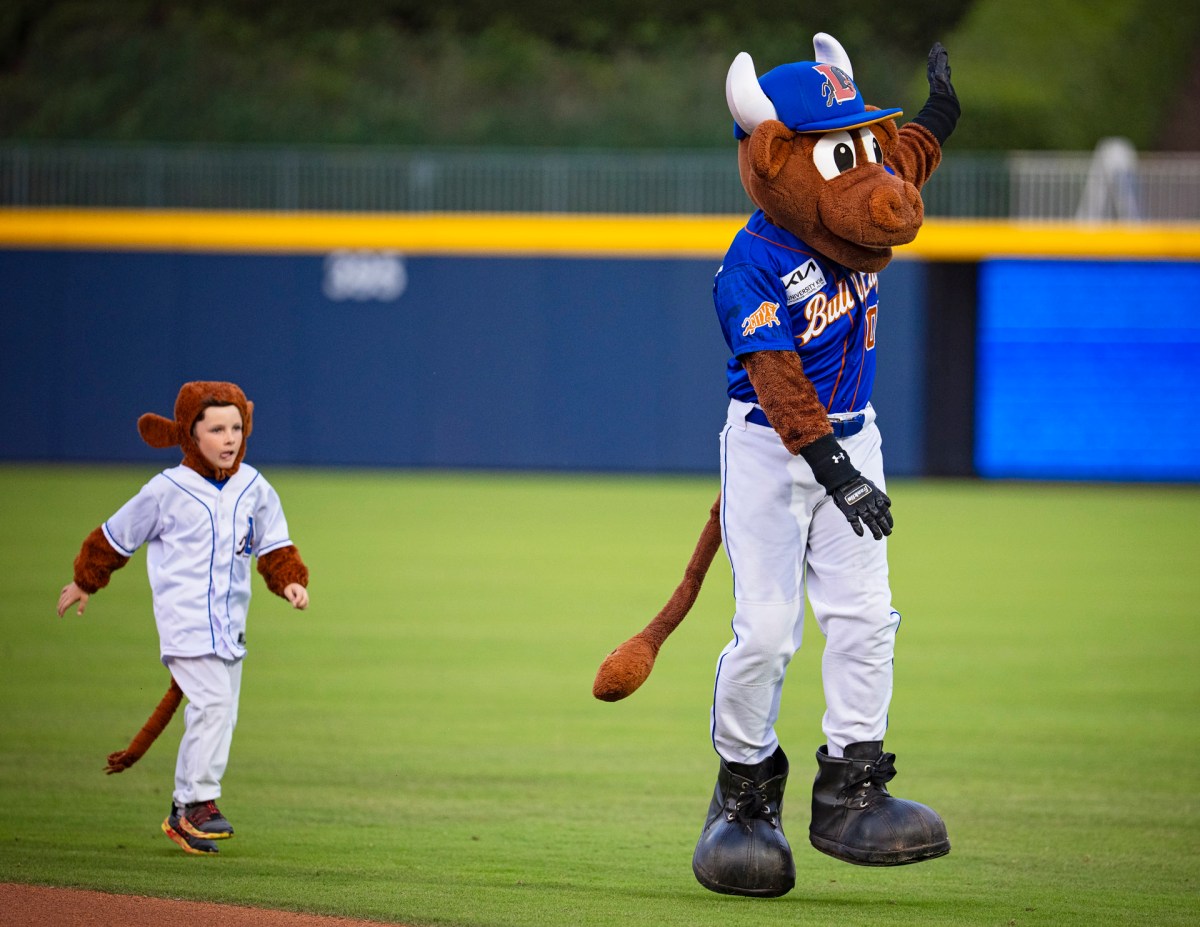
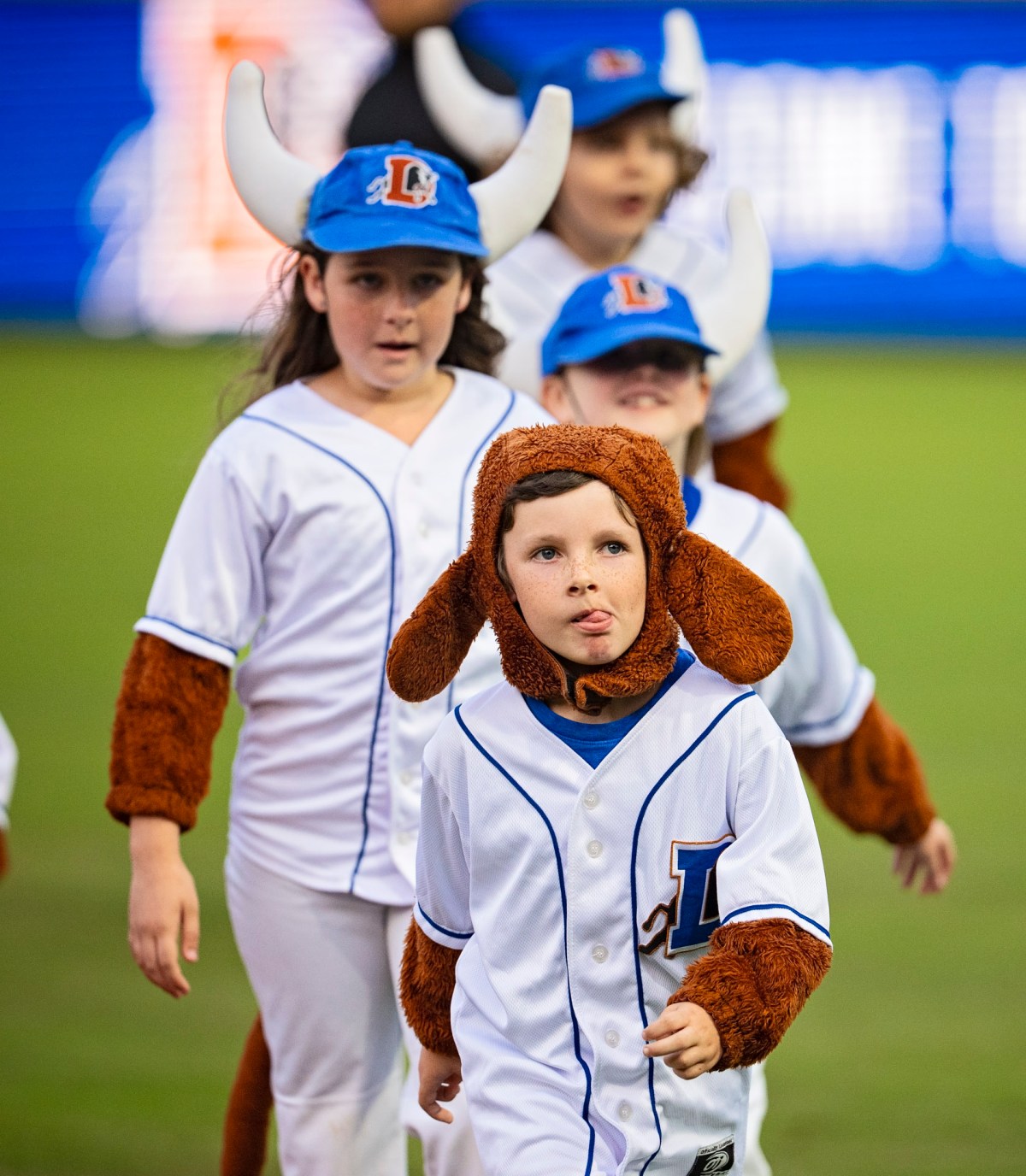
Today’s game provided my first medical emergencies. It seems someone [threw] up, and the mop man stops by to ask where he can find the seat. I take him to the aisle. I can’t tell if the perpetrator was a toddler or a tippler. It’s gone quickly. Later, a woman slips off a step and twists her ankle. Three EMTs arrive and spend a good deal of time ensuring she is all right. When they leave, she leaves as well. This is the only physical injury I will encounter.
After the game, the kids get to run the bases. All the toddlers head down to the field for a trip from home to third. Please stay on the dirt. The game? Oh yeah, there is also a baseball game. The Bulls win for the fourth time in a row. They have risen to mediocrity (won 16, lost 20). Is this the beginning of something good?
Friday, May 27
It is pouring rain, and I didn’t bring my raincoat. I sprint from my car to the stadium and arrive soaked and sweaty. On the field, there are blowers under a tarp protecting the infield. You don’t see these if a rain delay occurs during the game, so this is new to me. I assume the blowers are there to puff up the tarp and get the water to the drains in the outfield. Good idea, but now the left field grass looks like a small lake. Not to worry, the drainage system works superbly. Ten minutes after the rain stops, about an hour before game time, the outfield grass looks dry as a bone.
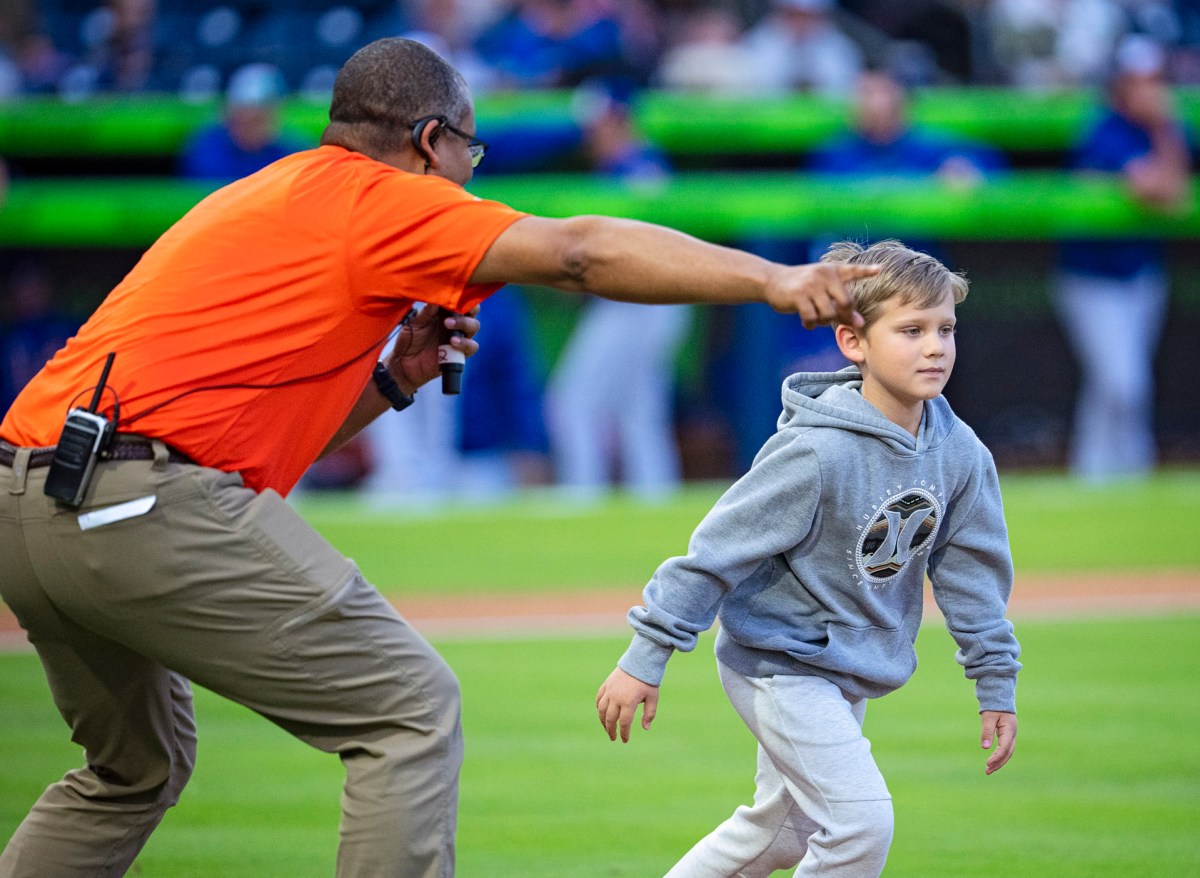
I go to check the seats in my two sections, again in left field foul territory. My 238 seats are all dripping water. It takes me 45 minutes to wipe them all down. “Pretend this is good exercise,” I repeat to myself. Bend down, wipe two seats, stand up, wring the towel dry, shuffle over two seats, repeat 119 times. I aggravate my thumb injury again on the seat arms. I’ll keep my (minimal) pain to myself. Don’t wanna get benched. I’m a pro.
Monday, July 4
They warned me about today. It’s the Fourth of July. It’s 95 degrees on the street outside the ballpark when I arrive. For the fireworks display after the game, all 10,000 seats will be filled, standing-room-only tickets will be sold out, and after the seventh inning the gates will be open for everyone who wants to come in and watch.
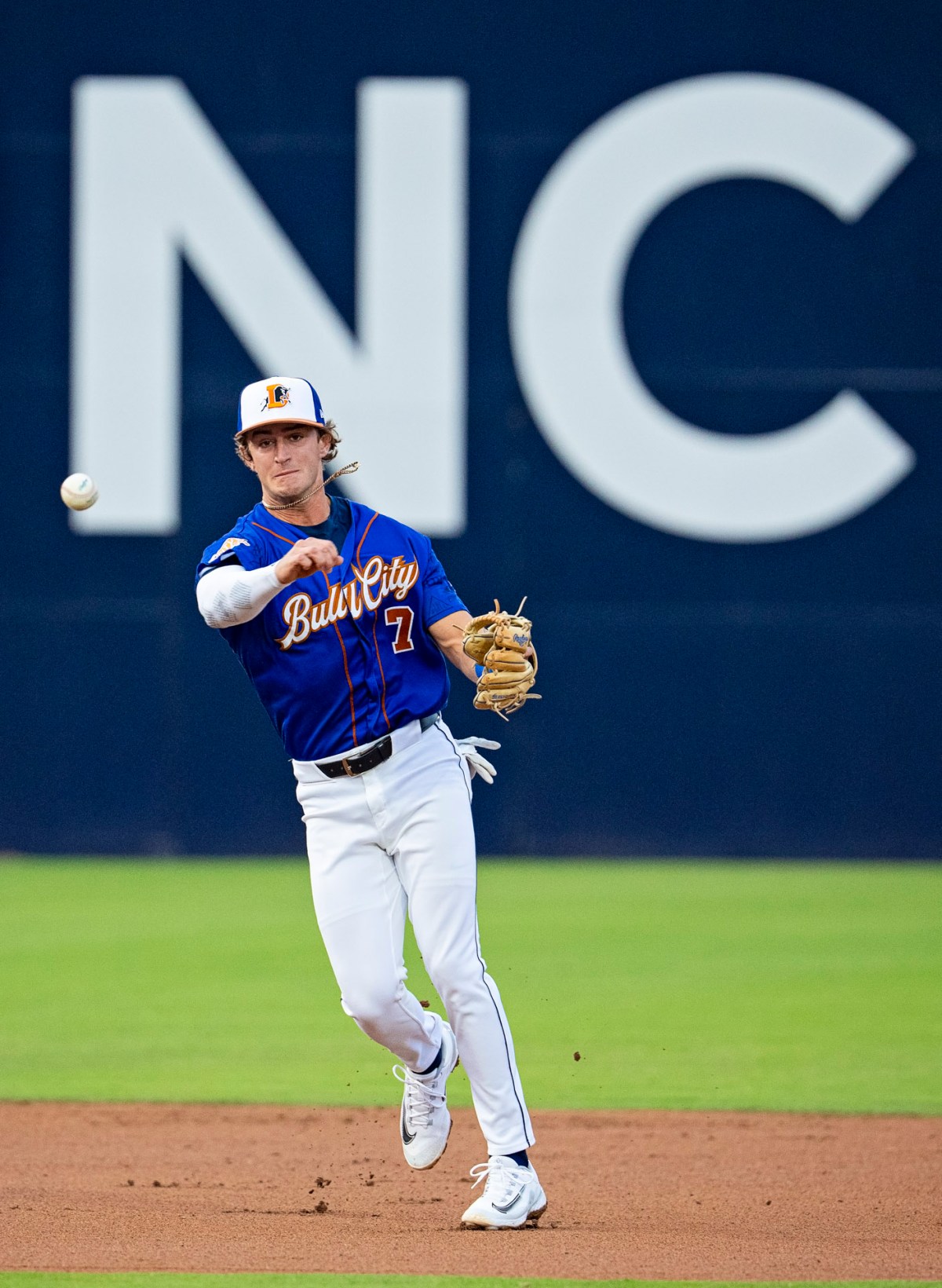
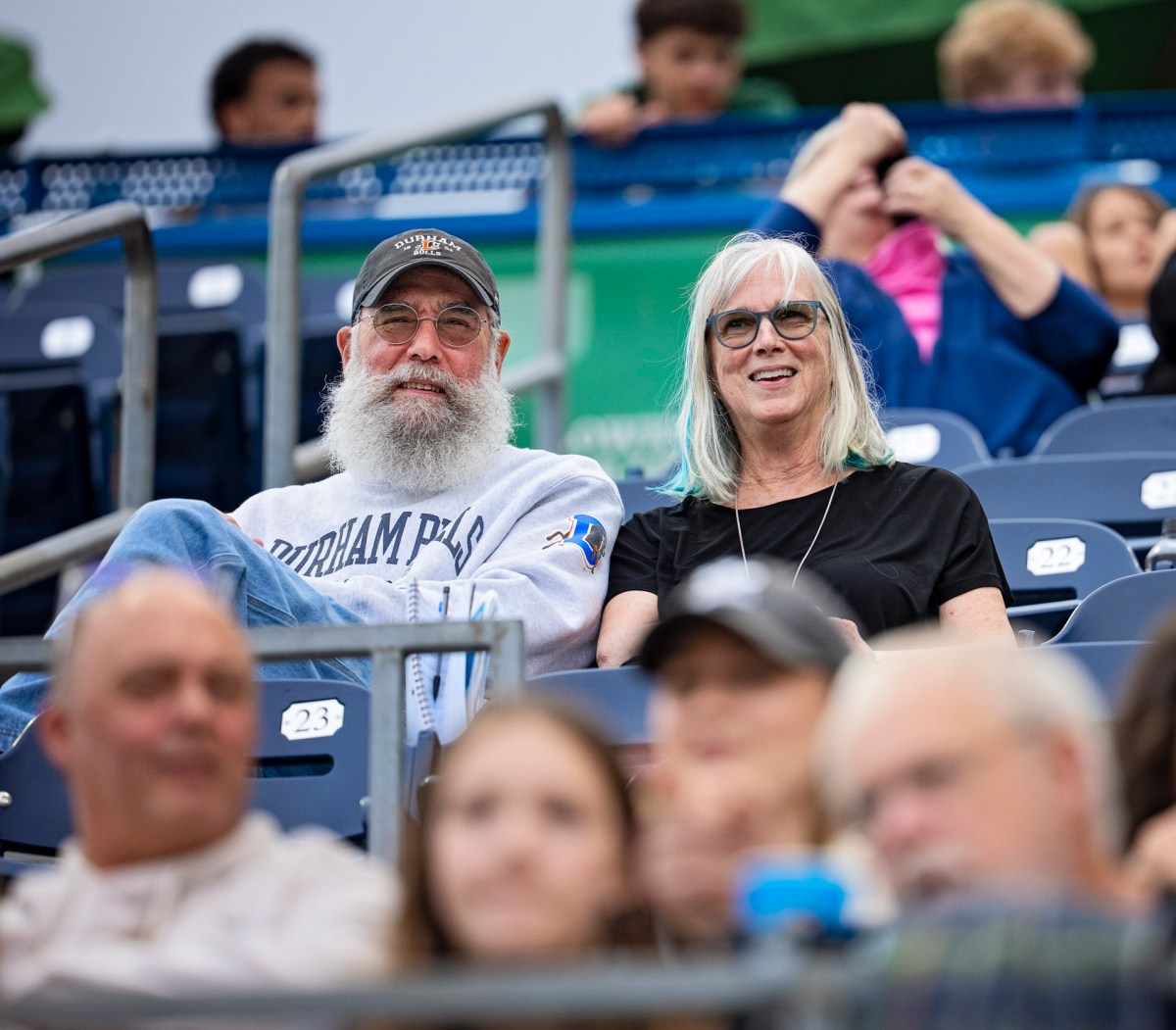
The fans start to pile in. Before the game begins, I can sense there are lots of folks here who don’t visit the ballpark very often. Two women with mobility issues climb 20 steps to get to their seats, which are less than 10 yards from an elevator they could have used. I assist them and show them where the lift is. A woman walks by me while she casually breastfeeds her infant child. A man walks by sporting a six-inch goatee dyed purple.
Then there is the attire. A burly young gentleman passes me wearing a backward ball cap, camo shorts, and a T-shirt that reads “Rebel Scum.” A young woman wears goth-style makeup, a heavy black dress, and black suede boots up to her thighs.
In this heat? The price we pay for fashion! An older gentleman walks by wearing a T-shirt with an outline portrait of a man and the name “Chomsky” underneath it–Noam Chomsky, the influential American linguist, philosopher, and leftist political activist. I hope he’s not sitting next to Rebel Scum guy. Or maybe they should talk.
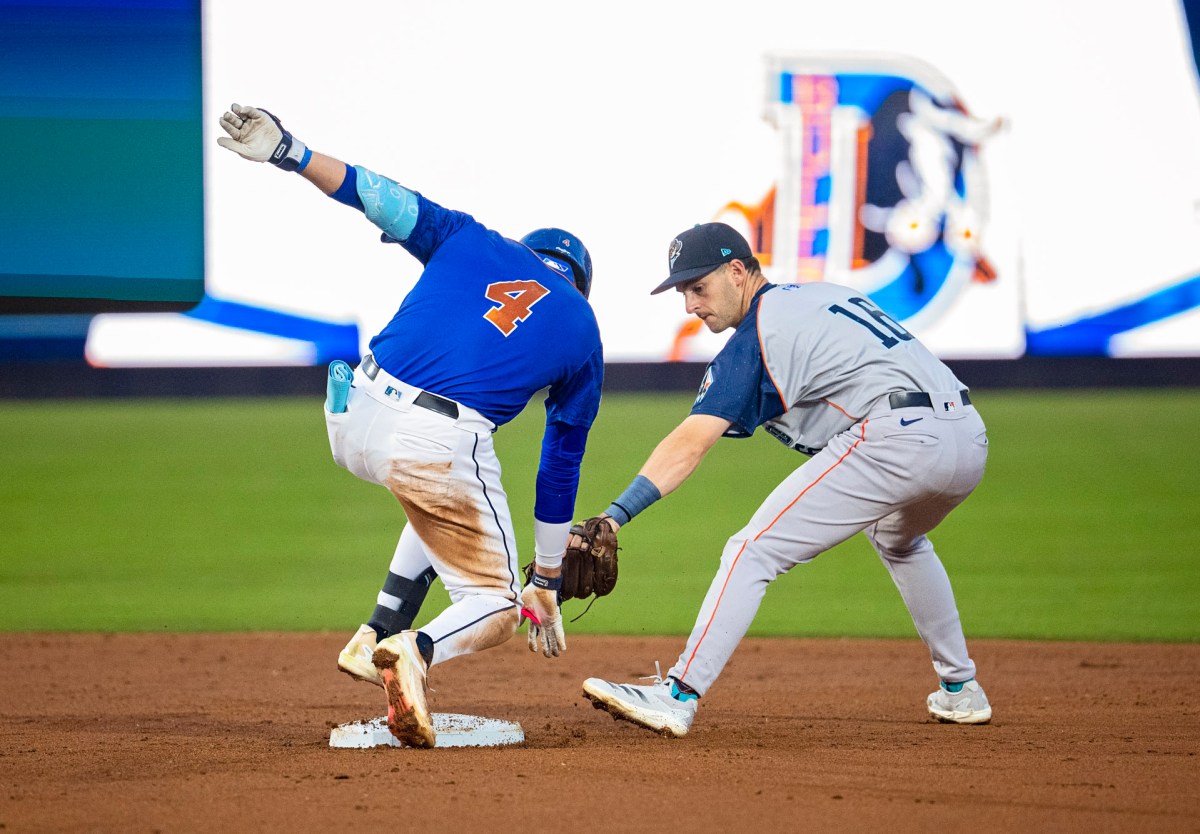
All in all, the weirdness I was led to expect this night did not materialize. Yes, the work was a bit harder and longer. Yes, the diverse crowds that typically fill the stadium for ballgames got a bit more diverse. I think that’s a good thing. Maybe some of the folks who came because it was a special evening will return when it isn’t a holiday occasion.
As I walk to my car, I can’t help but construct in my mind how I might moderate a conversation between Mr. Rebel Scum and Mr. Chomsky T-shirts. Would my first question be, “When did you first discover you enjoyed baseball?”
Saturday, July 30
Before the host meeting, Lisa [another usher] recounts an incident that happened last night in the upper-level seats behind home plate. Seems a belligerent male fan got into a confrontation with a female fan. He was a bit inebriated and was shouting offensive language. There were kids in the vicinity. He got into an argument with a woman sitting nearby who asked him to quiet down.
Little did the guy know the woman was a coach’s wife. A few cops showed up, stood nearby for a while, and the guy calmed down, then left. Later, the guy’s wife apologized to the coach’s wife. These kinds of incidents, which seriously worried me after my orientation, have been remarkably infrequent; I’ve heard of just two so far.
Behind me, there’s a guy with a dog on a leash. A wrap on the dog says she is in training to be a guide dog. Her handler tells me he is down from Washington, D.C., where he helps train the dogs. He’s in the process of moving to the Durham area. He takes the dogs on field trips, including outdoor events like baseball games, and even rides with them on the DC Metro. The dog rests attentively on the walkway next to him, calm as can be as a multitude of people walk by.
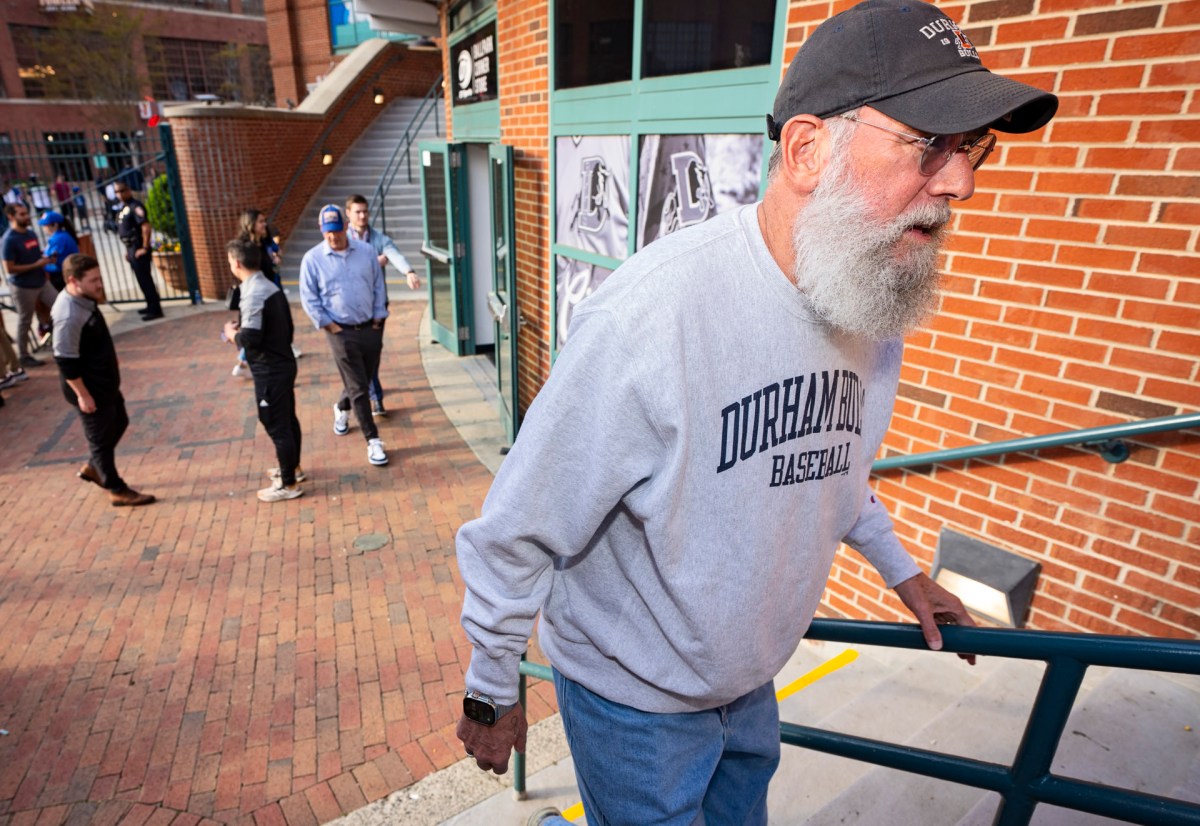
Tuesday, August 9
My assignment tonight is the first-base tunnel and the two sections in front of it. This is my first time manning a tunnel. It means I’ll be directing traffic as fans emerge from the passageway while they stare at their tickets wondering where their seats are. It will be a true test of how well I’ve learned the ballpark’s layout. I estimate maybe 1,500 people will come through the tunnel.
As traffic picks up, I realize I’m standing with my arms crossed. The social psychologist in me kicks in again. I know this pose is viewed as defensive, insecure (that’s me tonight), and closed off—not friendly at all. I consciously remind myself not to stand like this. Hands-on-hips (akimbo), at my sides, and behind my back will work better. And a smile can work wonders.
Friday, August 12
A gentleman arrives in my section with a group of teenage boys all wearing USA baseball caps. He asks for a food recommendation. “My favorites are the tacos and pizza,” I offer, and take the opportunity to make an inquiry of my own: “You here for USA baseball in Cary?”
“Yes, we’re here from the Bay Area. Under-15 ball.”
Later the boys tell me they’re from Livermore, California. I begin to notice lots of teens with USA baseball hats and T-shirts in the crowd. Psychologists call this “cognitive priming.” It happens when exposure to one stimulus leads to greater recognition of related stimuli. Have you ever thought about buying a particular make or color of a car, then suddenly start to see more cars of that make or color on the road? You know you have. It’s only human.
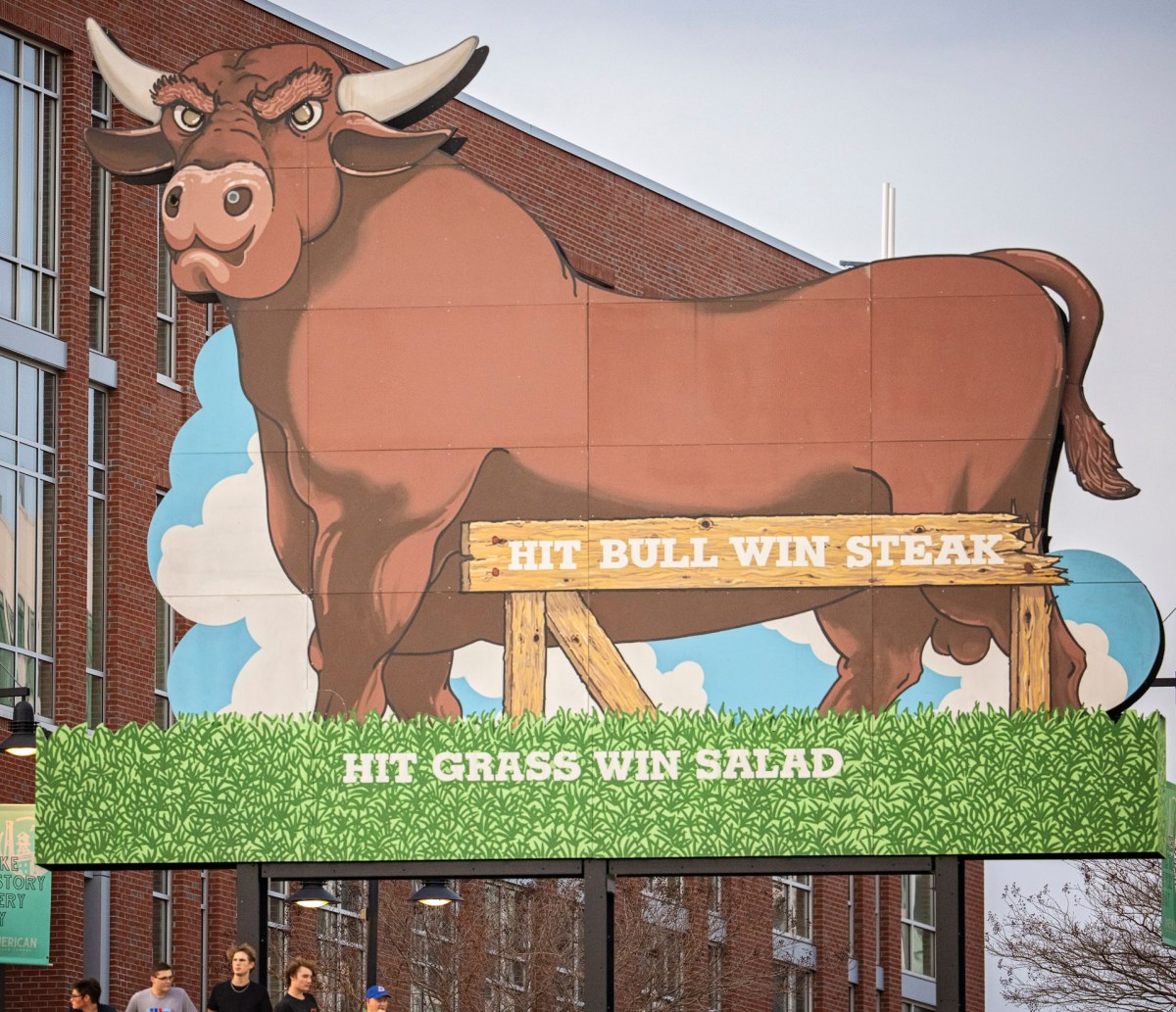
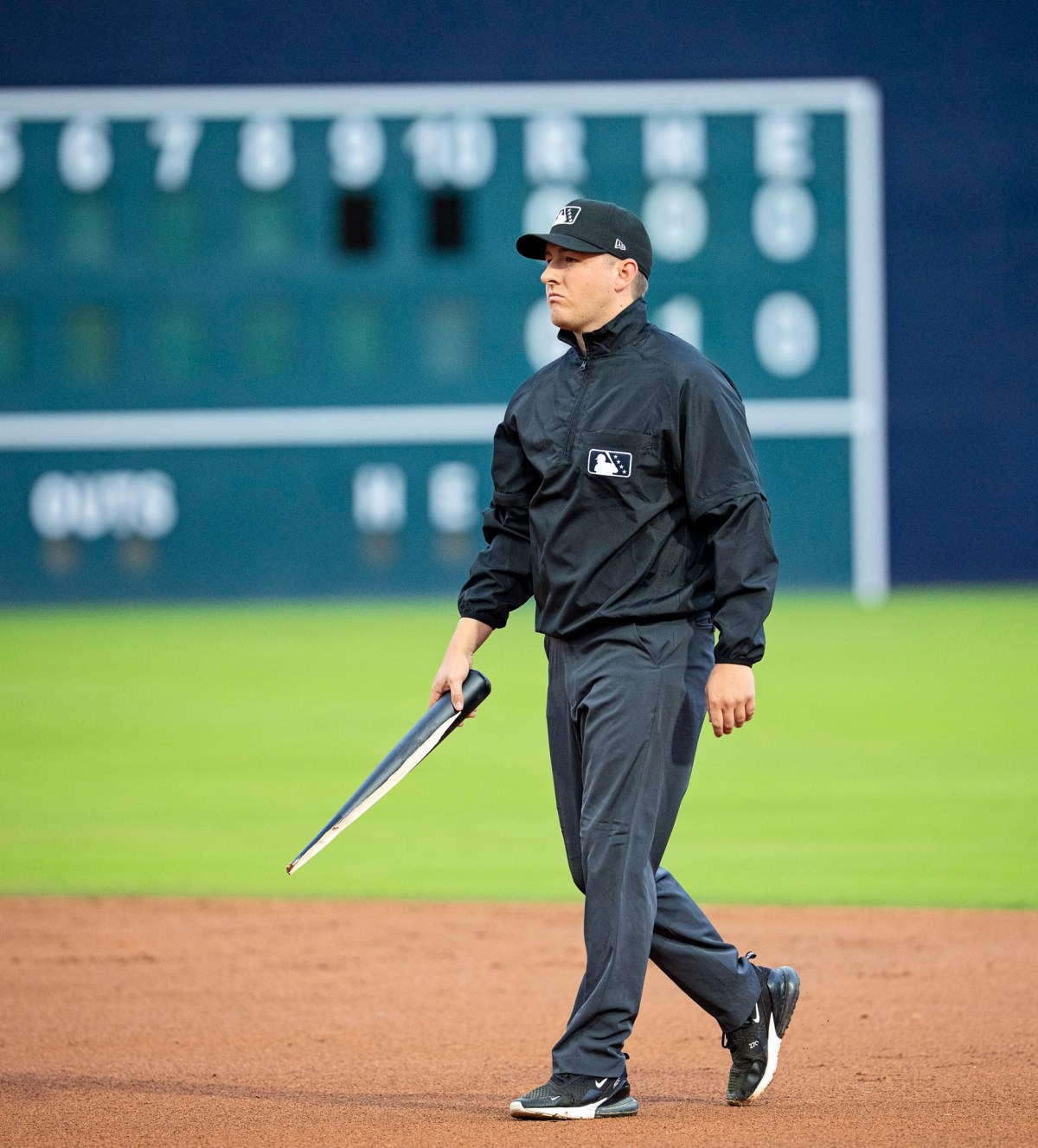
Friday, August 26
Tonight is another Cervezas de Durham night. The Bulls are serving beer in a hard plastic cup in the shape of a baseball bat, about two feet tall. Since I’m stationed in front of the bar at Jackie’s Landing, I can tell you the souvenir cups are a big hit.
In the top of the third inning, next to me there is a family with three kids, a boy maybe 5 years old, a girl maybe 3, and a babe-in-arms. The boy takes his dad’s empty beer bat and starts pounding it on the railing. It breaks, and the top part lands on the head of a woman in the seat below. No damage, but she looks angry and confronts the father. Dad asks Junior to apologize. The boy hides behind his father, wraps his arms around his leg, and begins to wail. The woman’s demeanor softens, and order is restored. While Dad gently lectures and consoles his son, I collect the shattered pieces of the cup for the trash can.
For the rest of the game, the tearful boy sits quietly as Dad explains to him different aspects of the game. In the bottom of the ninth, I approach and ask the boy if he’d like a baseball. Dad tells him to say thank you. He does, shyly.
“Say it louder,” Dad insists.
A louder “thank you” follows, as does an expression of appreciation from Dad.
After the fireworks, Junior approaches me yet again, by himself, with another thank you.
Baseballs really do contain magic.
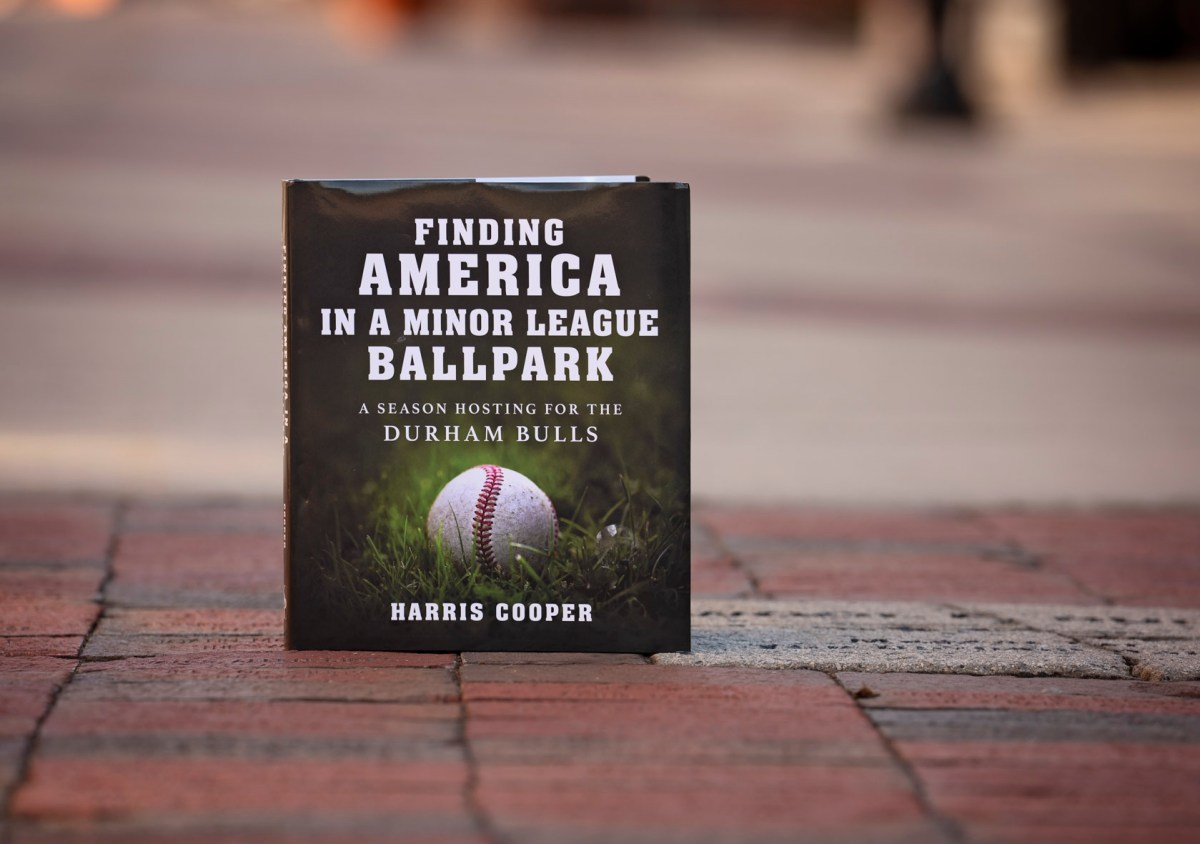
Sunday, September 25
“Happy last game!” shouts Lisa as we pass each other on the concourse.
“Boo!” I respond.
My spouse, Beth, is sitting in one of my sections. She has tolerated my love of baseball for nearly 50 years.
The season started with a kiss goodbye at our doorway when I left for work. Then, Beth started buying an occasional ticket, arriving late and leaving early. By season’s end, she’s at the games a half-hour before the first pitch and stays to the very end. She’s got a scorebook now. She answers questions from the less educated fans who sit around her. I think we may now share yet another interest.
At beers after the game, I sit next to John. He tells me he is headed for more surgery next week to help restore his voice. I tell him his impaired voice can’t hide his glowing personality, humor, and bright smile. As I get up to leave, we hug.
Editor’s note: The Bulls won the International League championship that season and went on to defeat the Reno Aces of the Pacific Coast League to become the 2022 champions of Triple-A baseball, the highest rung of minor league baseball.
